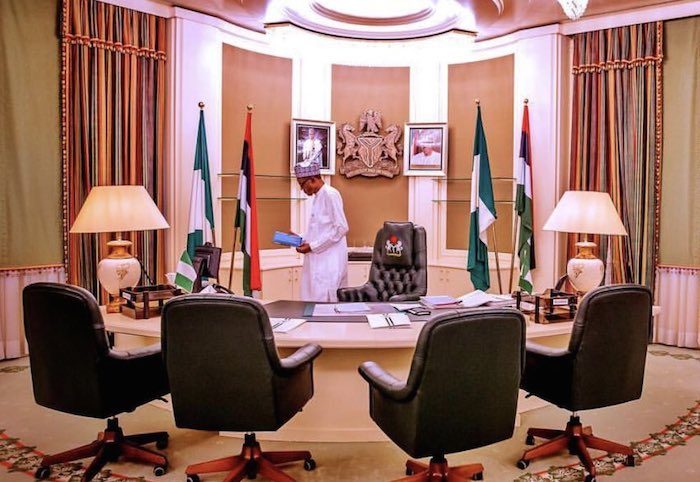..investors may demand higher yield on Moody’s downgrade …as Aramco set to raise $29bn from IPO
Nigerian President Muhammadu Buhari last week sought the approval of lawmakers to raise $29.96 billion to fund what he called 39 emergency projects in the power, agriculture and transport sectors.
If approved, the fresh borrowing will push the country’s total debt stock to N36 trillion from N25.7 trillion as of June 2019, according to data provided by the Debt Management Office (DMO).
The International Monetary Fund (IMF) said this week that Nigerian public debt as a percentage of GDP was 27 percent of GDP. That figure includes overdrafts with the Central Bank of Nigeria CBN.
A debt to GDP ratio below 30 percent is low compared to the emerging market average, but the worry is the rate of the debt accumulation as well as its actual use and the expensive toll it is taking on already strained public revenues.
The debt stock has almost tripled since 2015 with a chunk of the borrowing going into recurrent expenditure at the expense of capital projects. Official data reveal that total debt service cost accounted for 60 percent of government revenue in 2018.
These worries formed the basis of a downgrade by global ratings agency, Moody’s Investors Service this week. Moody’s downgraded Nigeria’s outlook to negative from stable for the first time in three years.
“The negative outlook reflects Moody’s view of increasing risks to the government’s fiscal strength and external position,” the credit ratings agency said.
“Already weak government finances will likely weaken further given an extremely narrow revenue base and persistently sluggish growth that hinders fiscal consolidation.
According to Moody’s, there is a risk that the government resorts to increasingly opaque and costly options to finance a moderate but rising debt burden.
Nigeria’s rising debt burden begs one question. Why borrow so much when you can raise equity?
Going after private capital is cheaper than borrowing bringing the government’s half-hearted push for private investment under scrutiny.
Choosing private capital over debt should be simple since it is less expensive but in Nigeria, the government has failed to take that opportunity, according to critics.
As surprising as it sounds, there are limited opportunities for foreign Direct Investors looking to park their cash in Nigeria.
That’s because Abuja has maintained its 100 percent ownership of key infrastructure, including rail transport, pipelines, power transmission, stadiums, public universities and tertiary hospitals across the country, effectively limiting options for private investment in the country.
Even the oil and gas sector, which has typically attracted the larger chunk of new FDIs to the country, has come unstuck, as a set of fiscal reforms (contained in the Petroleum Industry Bill meant to unlock new investments) has stalled for decades.
The lack of investment-friendly reforms has been telling with FDI flows likely to fall to a six year low of just over $800 million in 2019.
“Why cant it be Nigeria trying to do what Saudi Arabia is doing by seeking to sell some stake in Saudi Aramco?,” a senior banking source told BusinessDay.
“There are redundant government assets that can unlock trillions of naira, but it’s a pity we have the option to raise equity but we keep choosing debt without caring enough about the cost,” the source said.
Saudi Aramco announced late last night that it priced its initial public offering (IPO) at 32 riyals per share, valuing the company at $1.7 trillion. If all the shares offered are exercised, Aramco will raise $29.4 billion, making it the largest IPO in history.
Rather than go after FDI which is a good source of equity capital, the government has prioritised Foreign Portfolio Investors (FPIs), a trend Moody’s also warned that will hurt the country’s economy and leave it vulnerable to outflows when sentiment turns.
The central bank’s stock of so-called open-market operation (OMO) bills, an instrument used to borrow money from FPIs, has risen to N17.4 trillion ($48 billion) from N5 trillion in 2017, according to Moody’s.
Around a third are held by foreigners, it said, many of which are carry traders enticed by yields of about 13 percent.
“To attract foreign investors, the Central Bank of Nigeria is paying high interest rates on these certificates,” Moody’s analysts Samar Maziad and Marie Diron said in a statement. “This policy is very costly, and has a consequent impact on the yields of other government financing instruments.”
The strategy has worked in terms of keeping the naira stable, a key aim of both Governor Godwin Emefiele and President Muhammadu Buhari. It has barely budged against the dollar this year and is Africa’s best-performing major currency after the Egyptian pound.
The cost of that stability has however continued to cast a shadow over that approach.
Societe Generale doubts the trade, which has returned investors almost 30 percent in dollar terms so far in 2019, will lose its appeal soon. The French bank forecasts that the naira will slip only around 1 percent to 365 per dollar by the end of 2020.
“Nigerian fixed income has provided excellent returns and attracted large portfolio inflows over the past couple of years,” SocGen analysts including Singapore-based Jason Daw said Wednesday. “We expect this to continue.”
The pain will come once the music stops playing and investors begin to unwind the trade, analysts tell BusinessDay.
Source: businessdayng




